Business Waste Recycling: Evaluating Options for Sustainable Practices
VerifiedAdded on 2022/09/28
|15
|3532
|25
Report
AI Summary
This report presents a comprehensive business case study on business waste management and recycling. It begins with an executive summary and introduction, clearly outlining the problem of increasing waste generation by businesses and its environmental and economic impacts. The report analyzes the current state of waste management practices, highlighting the potential for recycling and reuse. It then discusses various options for waste reduction and recycling implementation within a business context, including composting, material recycling, and electronic waste management. The paper provides recommendations for businesses to adopt sustainable waste management practices, emphasizing the importance of sorting wastes, selecting recyclable materials, and educating customers and employees. The report concludes by presenting a chosen option of waste recycling and its benefits for a business, including cost savings, environmental benefits, and improved stakeholder relations. Finally, it highlights the significance of waste management in achieving overall sustainability goals.
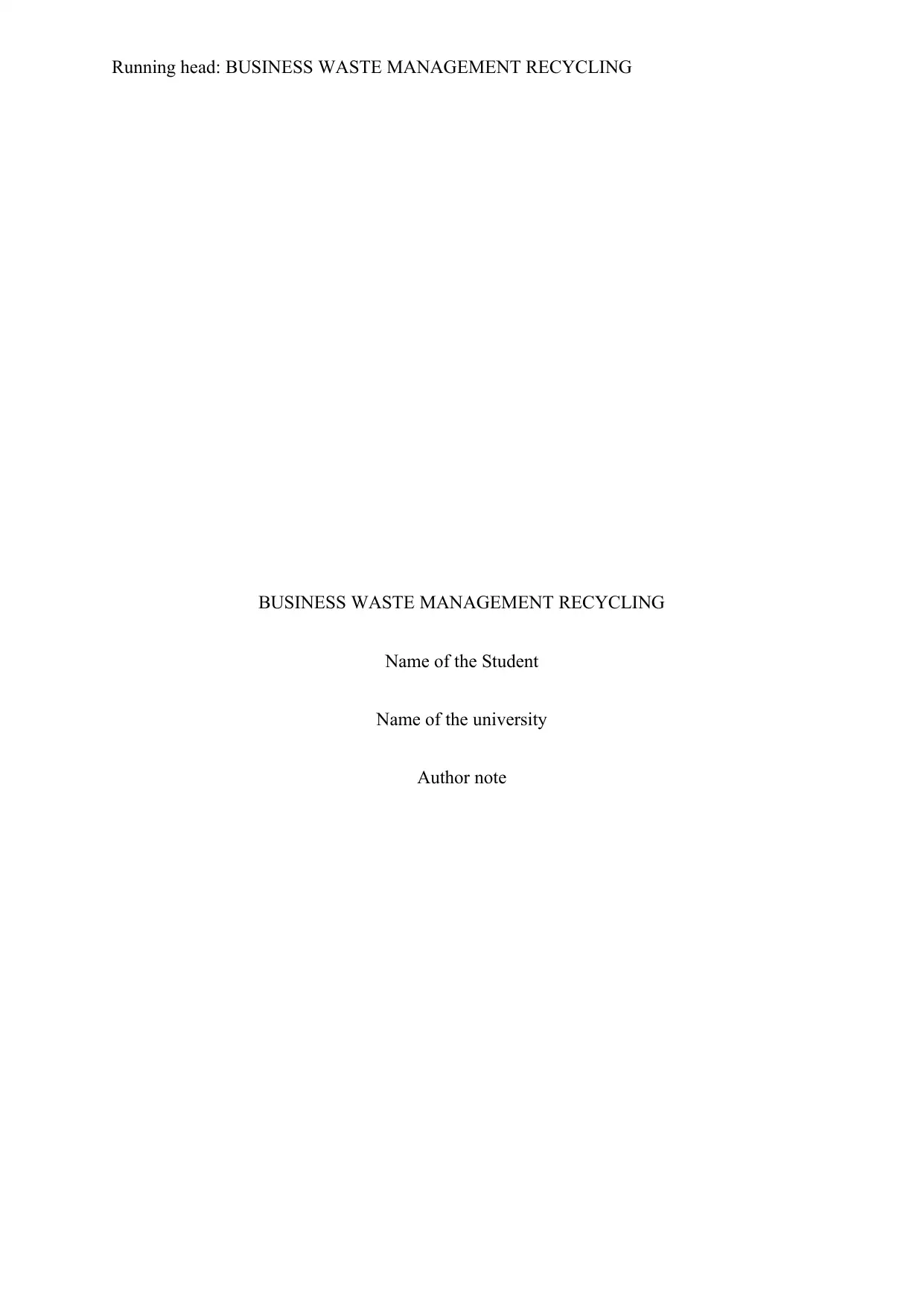
Running head: BUSINESS WASTE MANAGEMENT RECYCLING
BUSINESS WASTE MANAGEMENT RECYCLING
Name of the Student
Name of the university
Author note
BUSINESS WASTE MANAGEMENT RECYCLING
Name of the Student
Name of the university
Author note
Paraphrase This Document
Need a fresh take? Get an instant paraphrase of this document with our AI Paraphraser
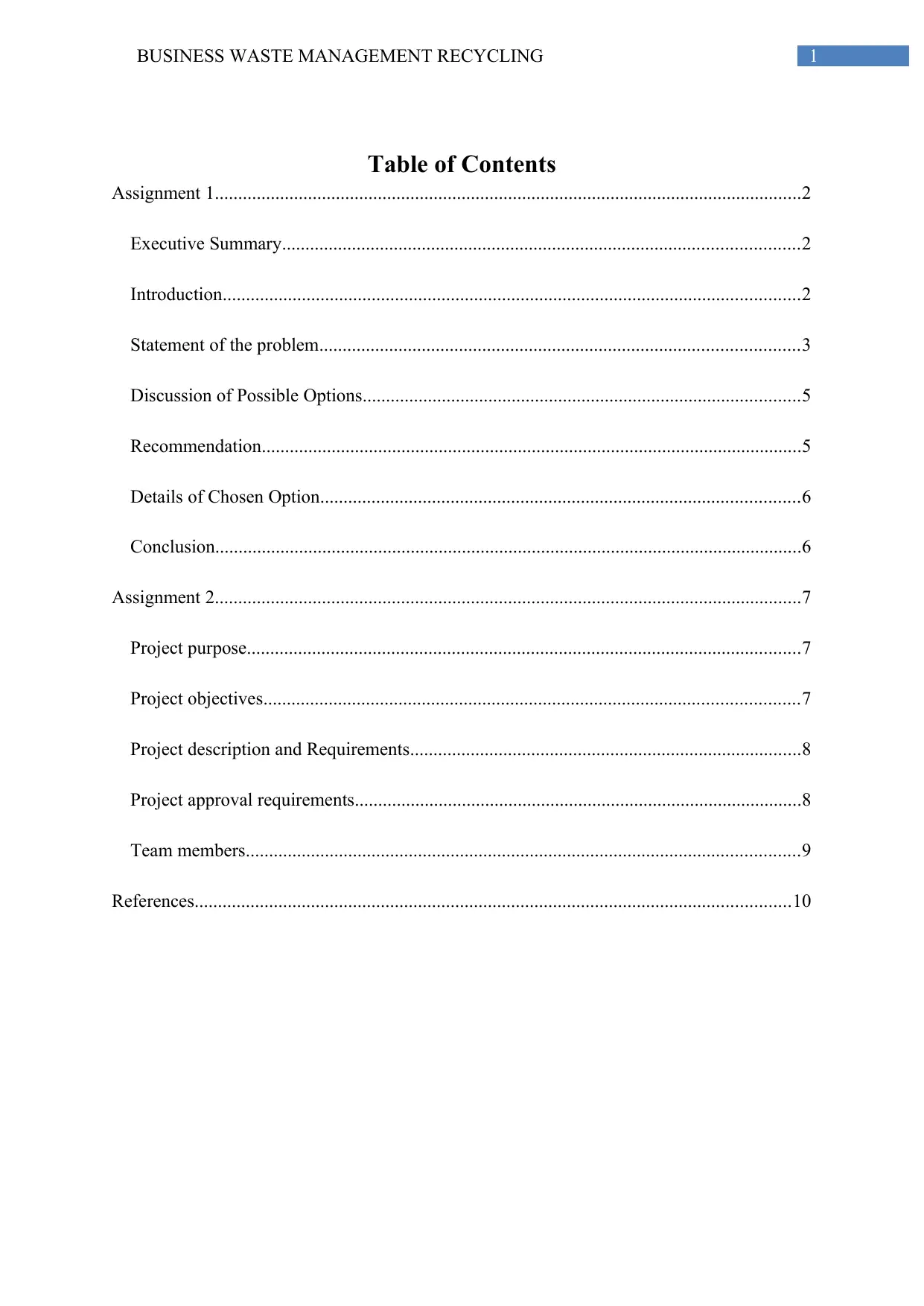
1BUSINESS WASTE MANAGEMENT RECYCLING
Table of Contents
Assignment 1..............................................................................................................................2
Executive Summary...............................................................................................................2
Introduction............................................................................................................................2
Statement of the problem.......................................................................................................3
Discussion of Possible Options..............................................................................................5
Recommendation....................................................................................................................5
Details of Chosen Option.......................................................................................................6
Conclusion..............................................................................................................................6
Assignment 2..............................................................................................................................7
Project purpose.......................................................................................................................7
Project objectives...................................................................................................................7
Project description and Requirements....................................................................................8
Project approval requirements................................................................................................8
Team members.......................................................................................................................9
References................................................................................................................................10
Table of Contents
Assignment 1..............................................................................................................................2
Executive Summary...............................................................................................................2
Introduction............................................................................................................................2
Statement of the problem.......................................................................................................3
Discussion of Possible Options..............................................................................................5
Recommendation....................................................................................................................5
Details of Chosen Option.......................................................................................................6
Conclusion..............................................................................................................................6
Assignment 2..............................................................................................................................7
Project purpose.......................................................................................................................7
Project objectives...................................................................................................................7
Project description and Requirements....................................................................................8
Project approval requirements................................................................................................8
Team members.......................................................................................................................9
References................................................................................................................................10
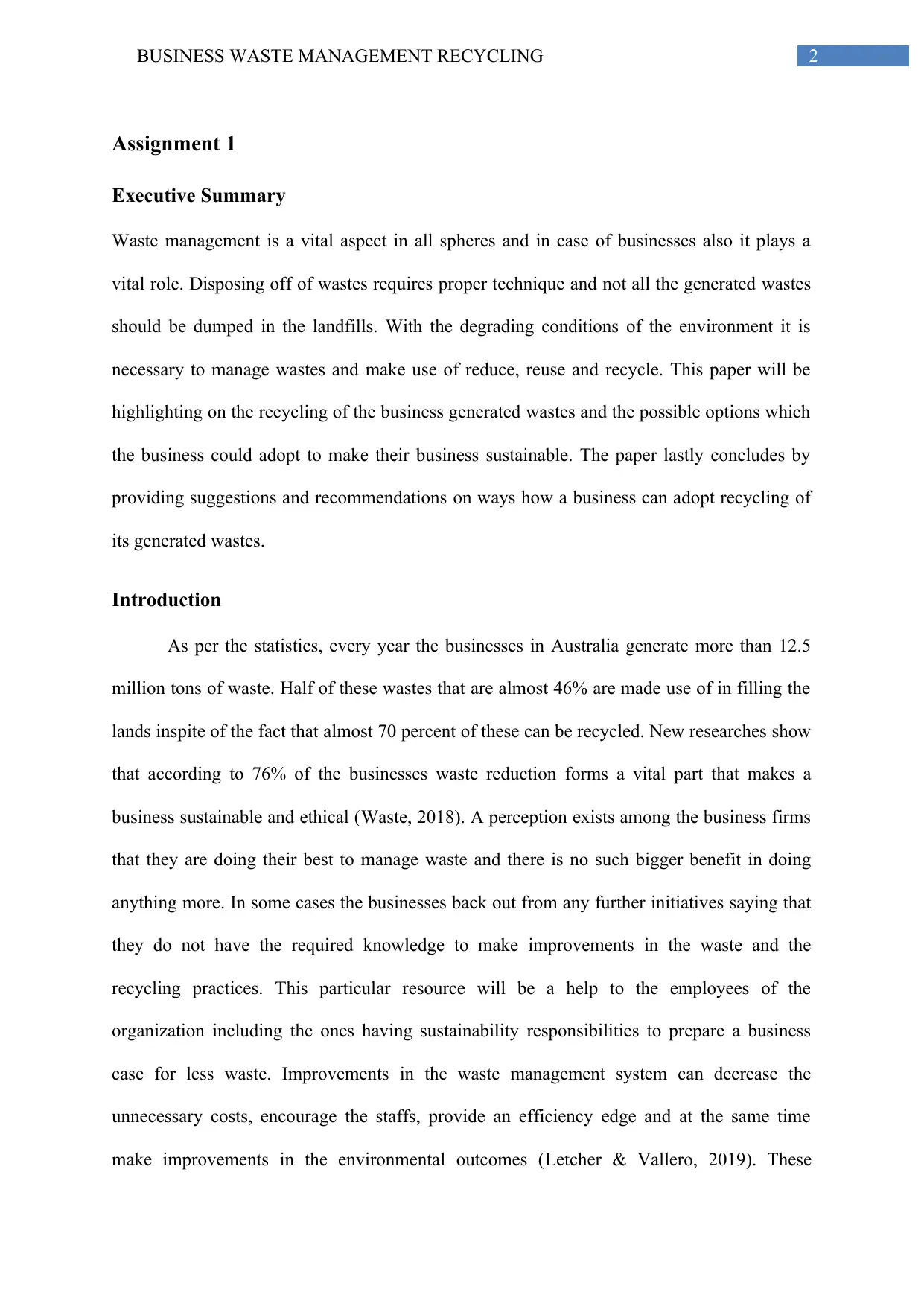
2BUSINESS WASTE MANAGEMENT RECYCLING
Assignment 1
Executive Summary
Waste management is a vital aspect in all spheres and in case of businesses also it plays a
vital role. Disposing off of wastes requires proper technique and not all the generated wastes
should be dumped in the landfills. With the degrading conditions of the environment it is
necessary to manage wastes and make use of reduce, reuse and recycle. This paper will be
highlighting on the recycling of the business generated wastes and the possible options which
the business could adopt to make their business sustainable. The paper lastly concludes by
providing suggestions and recommendations on ways how a business can adopt recycling of
its generated wastes.
Introduction
As per the statistics, every year the businesses in Australia generate more than 12.5
million tons of waste. Half of these wastes that are almost 46% are made use of in filling the
lands inspite of the fact that almost 70 percent of these can be recycled. New researches show
that according to 76% of the businesses waste reduction forms a vital part that makes a
business sustainable and ethical (Waste, 2018). A perception exists among the business firms
that they are doing their best to manage waste and there is no such bigger benefit in doing
anything more. In some cases the businesses back out from any further initiatives saying that
they do not have the required knowledge to make improvements in the waste and the
recycling practices. This particular resource will be a help to the employees of the
organization including the ones having sustainability responsibilities to prepare a business
case for less waste. Improvements in the waste management system can decrease the
unnecessary costs, encourage the staffs, provide an efficiency edge and at the same time
make improvements in the environmental outcomes (Letcher & Vallero, 2019). These
Assignment 1
Executive Summary
Waste management is a vital aspect in all spheres and in case of businesses also it plays a
vital role. Disposing off of wastes requires proper technique and not all the generated wastes
should be dumped in the landfills. With the degrading conditions of the environment it is
necessary to manage wastes and make use of reduce, reuse and recycle. This paper will be
highlighting on the recycling of the business generated wastes and the possible options which
the business could adopt to make their business sustainable. The paper lastly concludes by
providing suggestions and recommendations on ways how a business can adopt recycling of
its generated wastes.
Introduction
As per the statistics, every year the businesses in Australia generate more than 12.5
million tons of waste. Half of these wastes that are almost 46% are made use of in filling the
lands inspite of the fact that almost 70 percent of these can be recycled. New researches show
that according to 76% of the businesses waste reduction forms a vital part that makes a
business sustainable and ethical (Waste, 2018). A perception exists among the business firms
that they are doing their best to manage waste and there is no such bigger benefit in doing
anything more. In some cases the businesses back out from any further initiatives saying that
they do not have the required knowledge to make improvements in the waste and the
recycling practices. This particular resource will be a help to the employees of the
organization including the ones having sustainability responsibilities to prepare a business
case for less waste. Improvements in the waste management system can decrease the
unnecessary costs, encourage the staffs, provide an efficiency edge and at the same time
make improvements in the environmental outcomes (Letcher & Vallero, 2019). These
⊘ This is a preview!⊘
Do you want full access?
Subscribe today to unlock all pages.

Trusted by 1+ million students worldwide
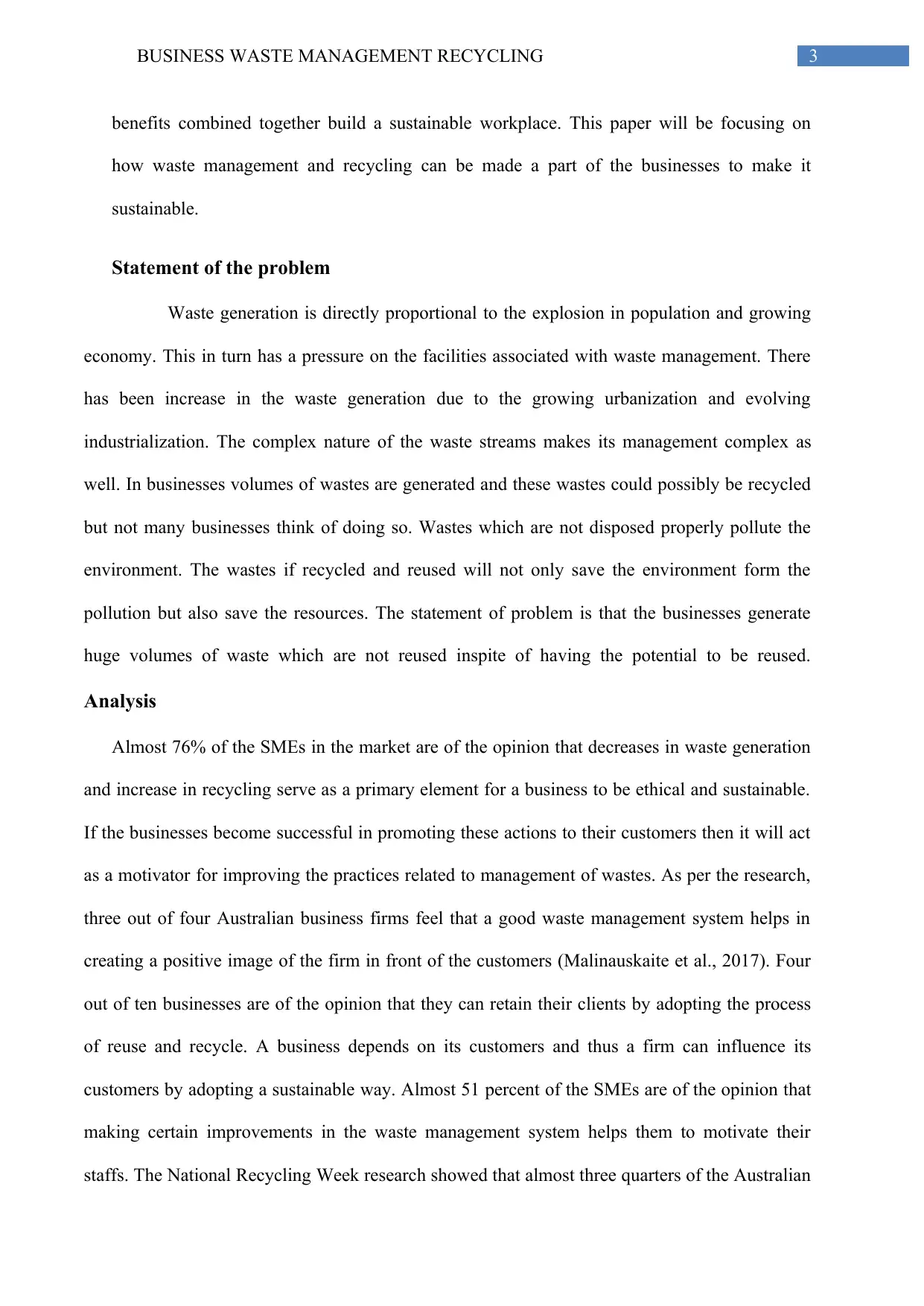
3BUSINESS WASTE MANAGEMENT RECYCLING
benefits combined together build a sustainable workplace. This paper will be focusing on
how waste management and recycling can be made a part of the businesses to make it
sustainable.
Statement of the problem
Waste generation is directly proportional to the explosion in population and growing
economy. This in turn has a pressure on the facilities associated with waste management. There
has been increase in the waste generation due to the growing urbanization and evolving
industrialization. The complex nature of the waste streams makes its management complex as
well. In businesses volumes of wastes are generated and these wastes could possibly be recycled
but not many businesses think of doing so. Wastes which are not disposed properly pollute the
environment. The wastes if recycled and reused will not only save the environment form the
pollution but also save the resources. The statement of problem is that the businesses generate
huge volumes of waste which are not reused inspite of having the potential to be reused.
Analysis
Almost 76% of the SMEs in the market are of the opinion that decreases in waste generation
and increase in recycling serve as a primary element for a business to be ethical and sustainable.
If the businesses become successful in promoting these actions to their customers then it will act
as a motivator for improving the practices related to management of wastes. As per the research,
three out of four Australian business firms feel that a good waste management system helps in
creating a positive image of the firm in front of the customers (Malinauskaite et al., 2017). Four
out of ten businesses are of the opinion that they can retain their clients by adopting the process
of reuse and recycle. A business depends on its customers and thus a firm can influence its
customers by adopting a sustainable way. Almost 51 percent of the SMEs are of the opinion that
making certain improvements in the waste management system helps them to motivate their
staffs. The National Recycling Week research showed that almost three quarters of the Australian
benefits combined together build a sustainable workplace. This paper will be focusing on
how waste management and recycling can be made a part of the businesses to make it
sustainable.
Statement of the problem
Waste generation is directly proportional to the explosion in population and growing
economy. This in turn has a pressure on the facilities associated with waste management. There
has been increase in the waste generation due to the growing urbanization and evolving
industrialization. The complex nature of the waste streams makes its management complex as
well. In businesses volumes of wastes are generated and these wastes could possibly be recycled
but not many businesses think of doing so. Wastes which are not disposed properly pollute the
environment. The wastes if recycled and reused will not only save the environment form the
pollution but also save the resources. The statement of problem is that the businesses generate
huge volumes of waste which are not reused inspite of having the potential to be reused.
Analysis
Almost 76% of the SMEs in the market are of the opinion that decreases in waste generation
and increase in recycling serve as a primary element for a business to be ethical and sustainable.
If the businesses become successful in promoting these actions to their customers then it will act
as a motivator for improving the practices related to management of wastes. As per the research,
three out of four Australian business firms feel that a good waste management system helps in
creating a positive image of the firm in front of the customers (Malinauskaite et al., 2017). Four
out of ten businesses are of the opinion that they can retain their clients by adopting the process
of reuse and recycle. A business depends on its customers and thus a firm can influence its
customers by adopting a sustainable way. Almost 51 percent of the SMEs are of the opinion that
making certain improvements in the waste management system helps them to motivate their
staffs. The National Recycling Week research showed that almost three quarters of the Australian
Paraphrase This Document
Need a fresh take? Get an instant paraphrase of this document with our AI Paraphraser
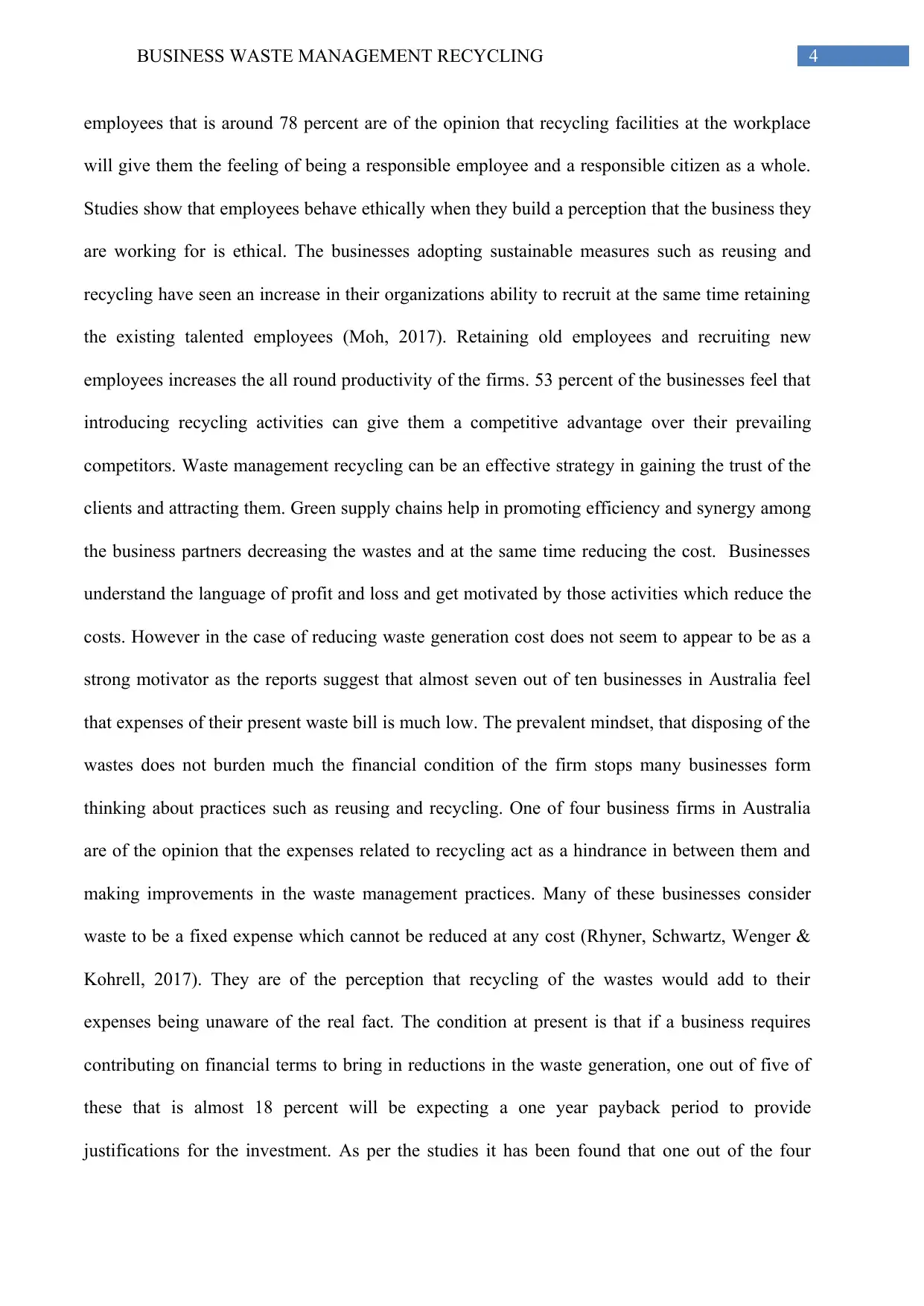
4BUSINESS WASTE MANAGEMENT RECYCLING
employees that is around 78 percent are of the opinion that recycling facilities at the workplace
will give them the feeling of being a responsible employee and a responsible citizen as a whole.
Studies show that employees behave ethically when they build a perception that the business they
are working for is ethical. The businesses adopting sustainable measures such as reusing and
recycling have seen an increase in their organizations ability to recruit at the same time retaining
the existing talented employees (Moh, 2017). Retaining old employees and recruiting new
employees increases the all round productivity of the firms. 53 percent of the businesses feel that
introducing recycling activities can give them a competitive advantage over their prevailing
competitors. Waste management recycling can be an effective strategy in gaining the trust of the
clients and attracting them. Green supply chains help in promoting efficiency and synergy among
the business partners decreasing the wastes and at the same time reducing the cost. Businesses
understand the language of profit and loss and get motivated by those activities which reduce the
costs. However in the case of reducing waste generation cost does not seem to appear to be as a
strong motivator as the reports suggest that almost seven out of ten businesses in Australia feel
that expenses of their present waste bill is much low. The prevalent mindset, that disposing of the
wastes does not burden much the financial condition of the firm stops many businesses form
thinking about practices such as reusing and recycling. One of four business firms in Australia
are of the opinion that the expenses related to recycling act as a hindrance in between them and
making improvements in the waste management practices. Many of these businesses consider
waste to be a fixed expense which cannot be reduced at any cost (Rhyner, Schwartz, Wenger &
Kohrell, 2017). They are of the perception that recycling of the wastes would add to their
expenses being unaware of the real fact. The condition at present is that if a business requires
contributing on financial terms to bring in reductions in the waste generation, one out of five of
these that is almost 18 percent will be expecting a one year payback period to provide
justifications for the investment. As per the studies it has been found that one out of the four
employees that is around 78 percent are of the opinion that recycling facilities at the workplace
will give them the feeling of being a responsible employee and a responsible citizen as a whole.
Studies show that employees behave ethically when they build a perception that the business they
are working for is ethical. The businesses adopting sustainable measures such as reusing and
recycling have seen an increase in their organizations ability to recruit at the same time retaining
the existing talented employees (Moh, 2017). Retaining old employees and recruiting new
employees increases the all round productivity of the firms. 53 percent of the businesses feel that
introducing recycling activities can give them a competitive advantage over their prevailing
competitors. Waste management recycling can be an effective strategy in gaining the trust of the
clients and attracting them. Green supply chains help in promoting efficiency and synergy among
the business partners decreasing the wastes and at the same time reducing the cost. Businesses
understand the language of profit and loss and get motivated by those activities which reduce the
costs. However in the case of reducing waste generation cost does not seem to appear to be as a
strong motivator as the reports suggest that almost seven out of ten businesses in Australia feel
that expenses of their present waste bill is much low. The prevalent mindset, that disposing of the
wastes does not burden much the financial condition of the firm stops many businesses form
thinking about practices such as reusing and recycling. One of four business firms in Australia
are of the opinion that the expenses related to recycling act as a hindrance in between them and
making improvements in the waste management practices. Many of these businesses consider
waste to be a fixed expense which cannot be reduced at any cost (Rhyner, Schwartz, Wenger &
Kohrell, 2017). They are of the perception that recycling of the wastes would add to their
expenses being unaware of the real fact. The condition at present is that if a business requires
contributing on financial terms to bring in reductions in the waste generation, one out of five of
these that is almost 18 percent will be expecting a one year payback period to provide
justifications for the investment. As per the studies it has been found that one out of the four
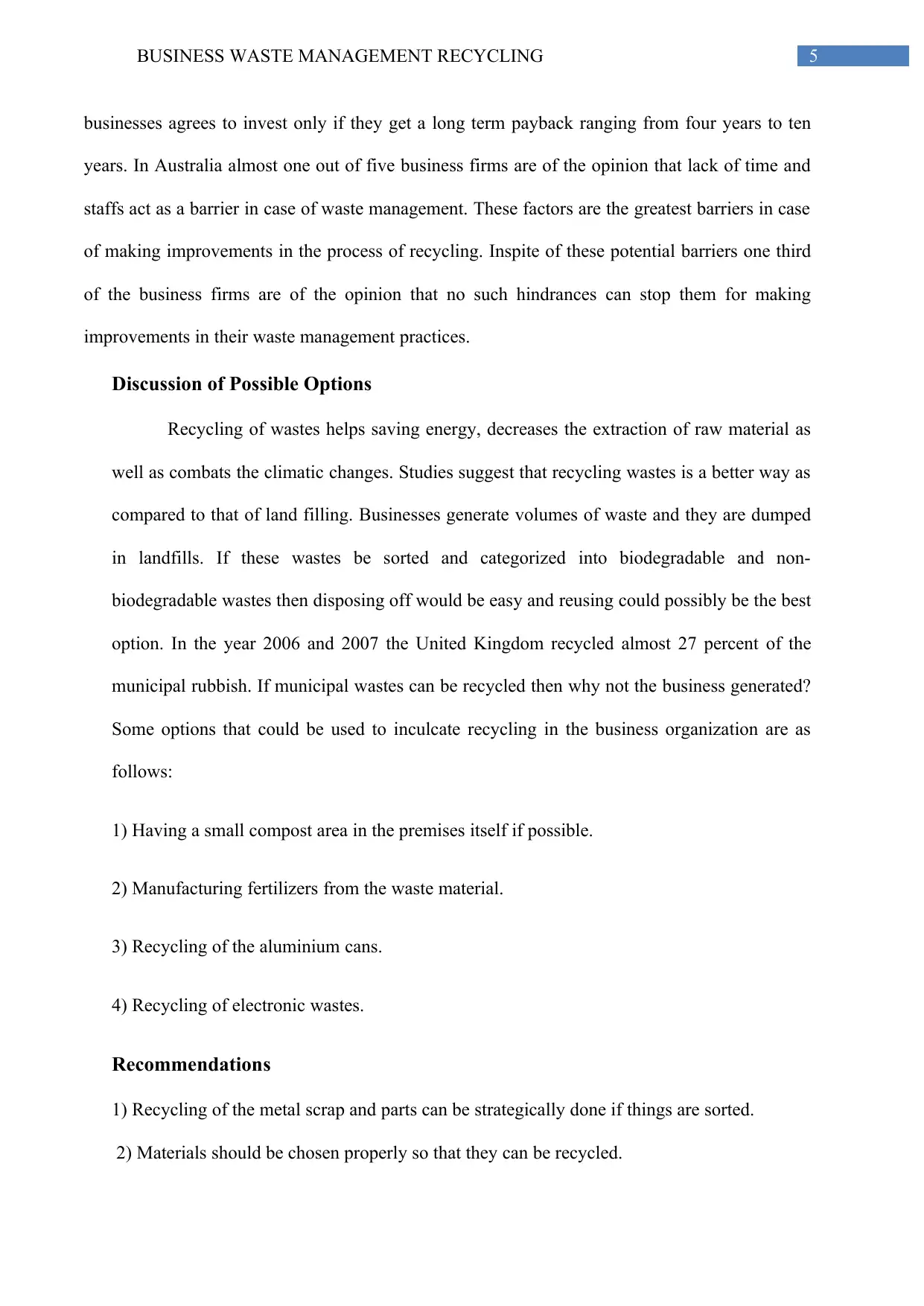
5BUSINESS WASTE MANAGEMENT RECYCLING
businesses agrees to invest only if they get a long term payback ranging from four years to ten
years. In Australia almost one out of five business firms are of the opinion that lack of time and
staffs act as a barrier in case of waste management. These factors are the greatest barriers in case
of making improvements in the process of recycling. Inspite of these potential barriers one third
of the business firms are of the opinion that no such hindrances can stop them for making
improvements in their waste management practices.
Discussion of Possible Options
Recycling of wastes helps saving energy, decreases the extraction of raw material as
well as combats the climatic changes. Studies suggest that recycling wastes is a better way as
compared to that of land filling. Businesses generate volumes of waste and they are dumped
in landfills. If these wastes be sorted and categorized into biodegradable and non-
biodegradable wastes then disposing off would be easy and reusing could possibly be the best
option. In the year 2006 and 2007 the United Kingdom recycled almost 27 percent of the
municipal rubbish. If municipal wastes can be recycled then why not the business generated?
Some options that could be used to inculcate recycling in the business organization are as
follows:
1) Having a small compost area in the premises itself if possible.
2) Manufacturing fertilizers from the waste material.
3) Recycling of the aluminium cans.
4) Recycling of electronic wastes.
Recommendations
1) Recycling of the metal scrap and parts can be strategically done if things are sorted.
2) Materials should be chosen properly so that they can be recycled.
businesses agrees to invest only if they get a long term payback ranging from four years to ten
years. In Australia almost one out of five business firms are of the opinion that lack of time and
staffs act as a barrier in case of waste management. These factors are the greatest barriers in case
of making improvements in the process of recycling. Inspite of these potential barriers one third
of the business firms are of the opinion that no such hindrances can stop them for making
improvements in their waste management practices.
Discussion of Possible Options
Recycling of wastes helps saving energy, decreases the extraction of raw material as
well as combats the climatic changes. Studies suggest that recycling wastes is a better way as
compared to that of land filling. Businesses generate volumes of waste and they are dumped
in landfills. If these wastes be sorted and categorized into biodegradable and non-
biodegradable wastes then disposing off would be easy and reusing could possibly be the best
option. In the year 2006 and 2007 the United Kingdom recycled almost 27 percent of the
municipal rubbish. If municipal wastes can be recycled then why not the business generated?
Some options that could be used to inculcate recycling in the business organization are as
follows:
1) Having a small compost area in the premises itself if possible.
2) Manufacturing fertilizers from the waste material.
3) Recycling of the aluminium cans.
4) Recycling of electronic wastes.
Recommendations
1) Recycling of the metal scrap and parts can be strategically done if things are sorted.
2) Materials should be chosen properly so that they can be recycled.
⊘ This is a preview!⊘
Do you want full access?
Subscribe today to unlock all pages.

Trusted by 1+ million students worldwide
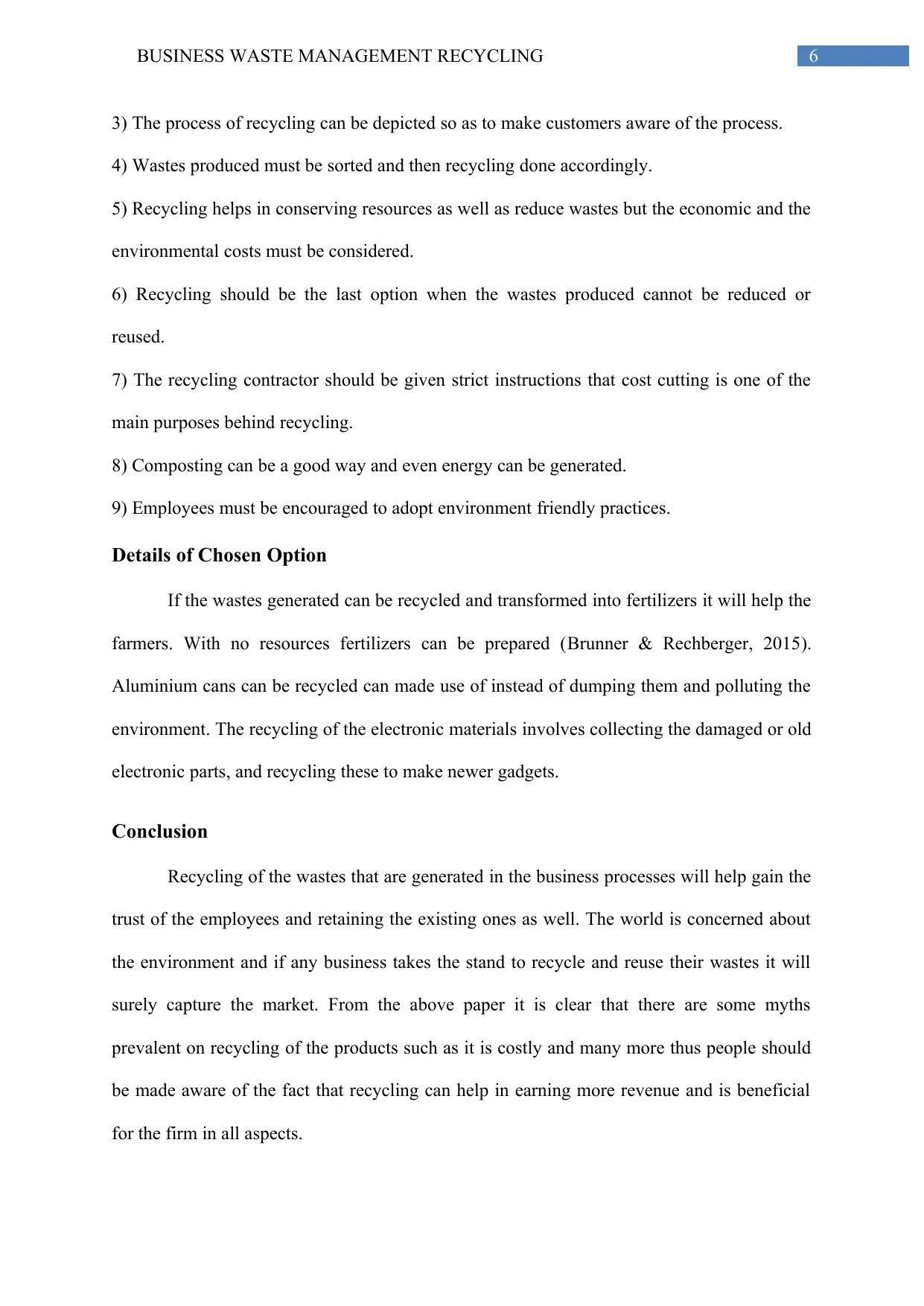
6BUSINESS WASTE MANAGEMENT RECYCLING
3) The process of recycling can be depicted so as to make customers aware of the process.
4) Wastes produced must be sorted and then recycling done accordingly.
5) Recycling helps in conserving resources as well as reduce wastes but the economic and the
environmental costs must be considered.
6) Recycling should be the last option when the wastes produced cannot be reduced or
reused.
7) The recycling contractor should be given strict instructions that cost cutting is one of the
main purposes behind recycling.
8) Composting can be a good way and even energy can be generated.
9) Employees must be encouraged to adopt environment friendly practices.
Details of Chosen Option
If the wastes generated can be recycled and transformed into fertilizers it will help the
farmers. With no resources fertilizers can be prepared (Brunner & Rechberger, 2015).
Aluminium cans can be recycled can made use of instead of dumping them and polluting the
environment. The recycling of the electronic materials involves collecting the damaged or old
electronic parts, and recycling these to make newer gadgets.
Conclusion
Recycling of the wastes that are generated in the business processes will help gain the
trust of the employees and retaining the existing ones as well. The world is concerned about
the environment and if any business takes the stand to recycle and reuse their wastes it will
surely capture the market. From the above paper it is clear that there are some myths
prevalent on recycling of the products such as it is costly and many more thus people should
be made aware of the fact that recycling can help in earning more revenue and is beneficial
for the firm in all aspects.
3) The process of recycling can be depicted so as to make customers aware of the process.
4) Wastes produced must be sorted and then recycling done accordingly.
5) Recycling helps in conserving resources as well as reduce wastes but the economic and the
environmental costs must be considered.
6) Recycling should be the last option when the wastes produced cannot be reduced or
reused.
7) The recycling contractor should be given strict instructions that cost cutting is one of the
main purposes behind recycling.
8) Composting can be a good way and even energy can be generated.
9) Employees must be encouraged to adopt environment friendly practices.
Details of Chosen Option
If the wastes generated can be recycled and transformed into fertilizers it will help the
farmers. With no resources fertilizers can be prepared (Brunner & Rechberger, 2015).
Aluminium cans can be recycled can made use of instead of dumping them and polluting the
environment. The recycling of the electronic materials involves collecting the damaged or old
electronic parts, and recycling these to make newer gadgets.
Conclusion
Recycling of the wastes that are generated in the business processes will help gain the
trust of the employees and retaining the existing ones as well. The world is concerned about
the environment and if any business takes the stand to recycle and reuse their wastes it will
surely capture the market. From the above paper it is clear that there are some myths
prevalent on recycling of the products such as it is costly and many more thus people should
be made aware of the fact that recycling can help in earning more revenue and is beneficial
for the firm in all aspects.
Paraphrase This Document
Need a fresh take? Get an instant paraphrase of this document with our AI Paraphraser

7BUSINESS WASTE MANAGEMENT RECYCLING
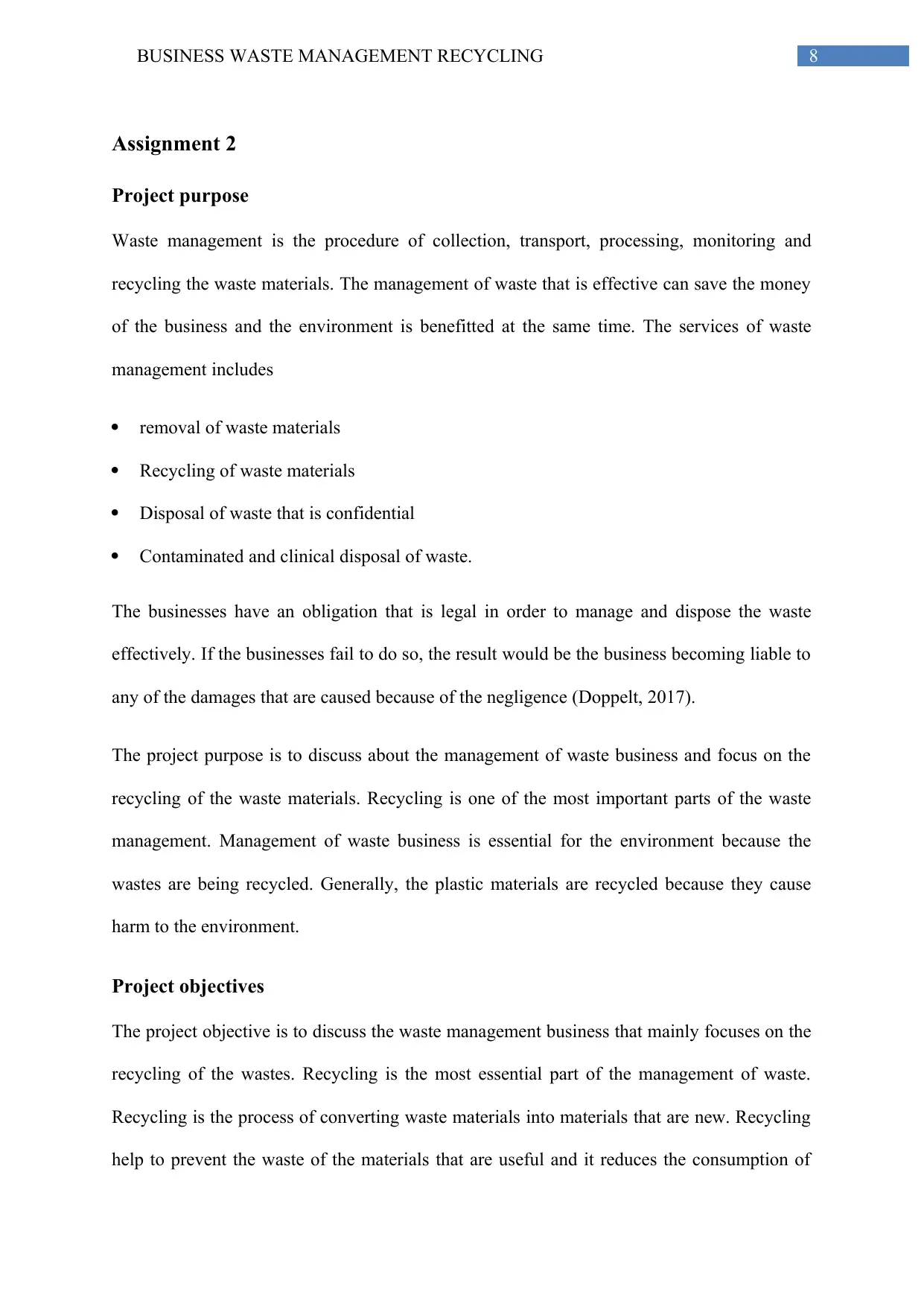
8BUSINESS WASTE MANAGEMENT RECYCLING
Assignment 2
Project purpose
Waste management is the procedure of collection, transport, processing, monitoring and
recycling the waste materials. The management of waste that is effective can save the money
of the business and the environment is benefitted at the same time. The services of waste
management includes
removal of waste materials
Recycling of waste materials
Disposal of waste that is confidential
Contaminated and clinical disposal of waste.
The businesses have an obligation that is legal in order to manage and dispose the waste
effectively. If the businesses fail to do so, the result would be the business becoming liable to
any of the damages that are caused because of the negligence (Doppelt, 2017).
The project purpose is to discuss about the management of waste business and focus on the
recycling of the waste materials. Recycling is one of the most important parts of the waste
management. Management of waste business is essential for the environment because the
wastes are being recycled. Generally, the plastic materials are recycled because they cause
harm to the environment.
Project objectives
The project objective is to discuss the waste management business that mainly focuses on the
recycling of the wastes. Recycling is the most essential part of the management of waste.
Recycling is the process of converting waste materials into materials that are new. Recycling
help to prevent the waste of the materials that are useful and it reduces the consumption of
Assignment 2
Project purpose
Waste management is the procedure of collection, transport, processing, monitoring and
recycling the waste materials. The management of waste that is effective can save the money
of the business and the environment is benefitted at the same time. The services of waste
management includes
removal of waste materials
Recycling of waste materials
Disposal of waste that is confidential
Contaminated and clinical disposal of waste.
The businesses have an obligation that is legal in order to manage and dispose the waste
effectively. If the businesses fail to do so, the result would be the business becoming liable to
any of the damages that are caused because of the negligence (Doppelt, 2017).
The project purpose is to discuss about the management of waste business and focus on the
recycling of the waste materials. Recycling is one of the most important parts of the waste
management. Management of waste business is essential for the environment because the
wastes are being recycled. Generally, the plastic materials are recycled because they cause
harm to the environment.
Project objectives
The project objective is to discuss the waste management business that mainly focuses on the
recycling of the wastes. Recycling is the most essential part of the management of waste.
Recycling is the process of converting waste materials into materials that are new. Recycling
help to prevent the waste of the materials that are useful and it reduces the consumption of
⊘ This is a preview!⊘
Do you want full access?
Subscribe today to unlock all pages.

Trusted by 1+ million students worldwide
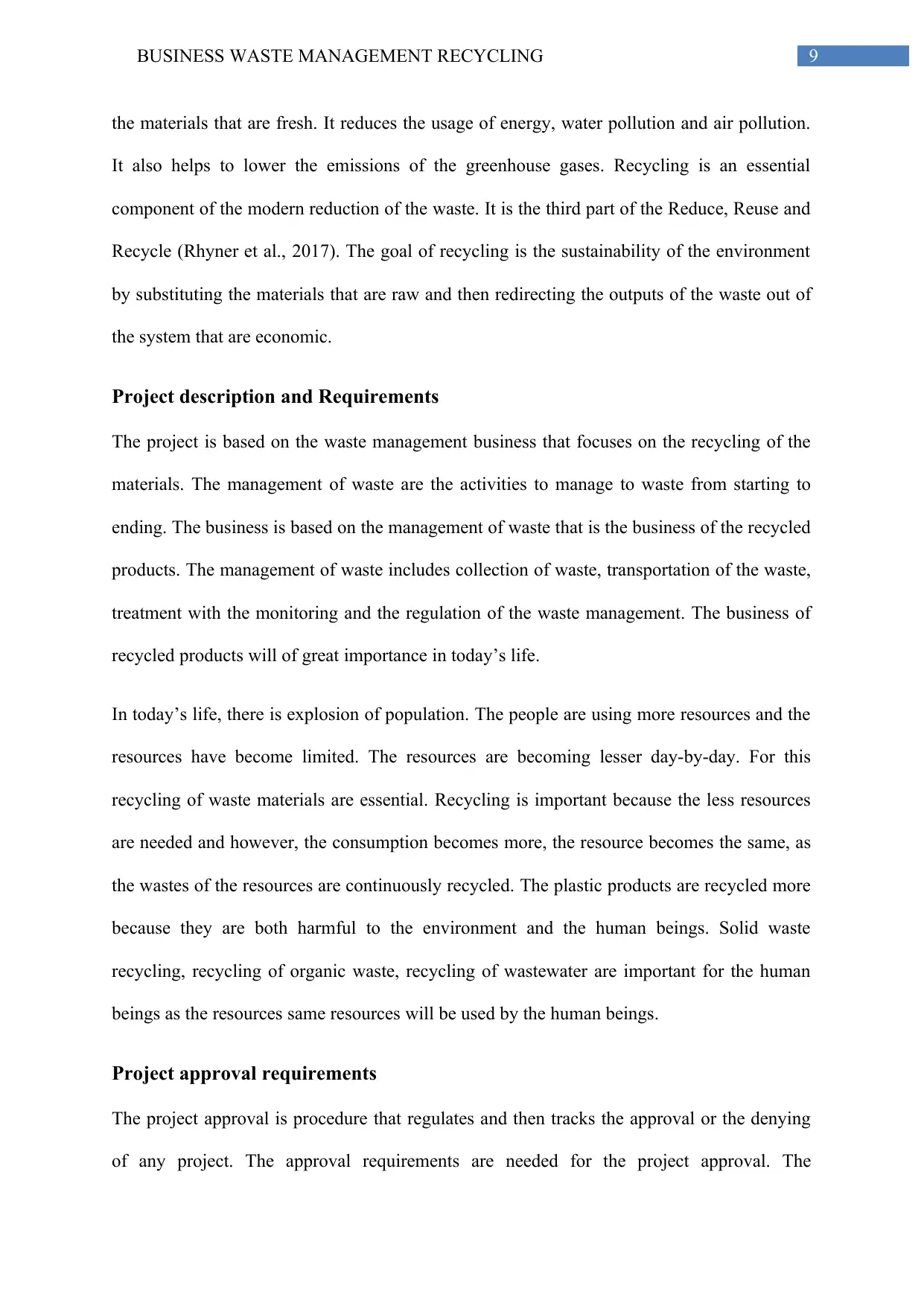
9BUSINESS WASTE MANAGEMENT RECYCLING
the materials that are fresh. It reduces the usage of energy, water pollution and air pollution.
It also helps to lower the emissions of the greenhouse gases. Recycling is an essential
component of the modern reduction of the waste. It is the third part of the Reduce, Reuse and
Recycle (Rhyner et al., 2017). The goal of recycling is the sustainability of the environment
by substituting the materials that are raw and then redirecting the outputs of the waste out of
the system that are economic.
Project description and Requirements
The project is based on the waste management business that focuses on the recycling of the
materials. The management of waste are the activities to manage to waste from starting to
ending. The business is based on the management of waste that is the business of the recycled
products. The management of waste includes collection of waste, transportation of the waste,
treatment with the monitoring and the regulation of the waste management. The business of
recycled products will of great importance in today’s life.
In today’s life, there is explosion of population. The people are using more resources and the
resources have become limited. The resources are becoming lesser day-by-day. For this
recycling of waste materials are essential. Recycling is important because the less resources
are needed and however, the consumption becomes more, the resource becomes the same, as
the wastes of the resources are continuously recycled. The plastic products are recycled more
because they are both harmful to the environment and the human beings. Solid waste
recycling, recycling of organic waste, recycling of wastewater are important for the human
beings as the resources same resources will be used by the human beings.
Project approval requirements
The project approval is procedure that regulates and then tracks the approval or the denying
of any project. The approval requirements are needed for the project approval. The
the materials that are fresh. It reduces the usage of energy, water pollution and air pollution.
It also helps to lower the emissions of the greenhouse gases. Recycling is an essential
component of the modern reduction of the waste. It is the third part of the Reduce, Reuse and
Recycle (Rhyner et al., 2017). The goal of recycling is the sustainability of the environment
by substituting the materials that are raw and then redirecting the outputs of the waste out of
the system that are economic.
Project description and Requirements
The project is based on the waste management business that focuses on the recycling of the
materials. The management of waste are the activities to manage to waste from starting to
ending. The business is based on the management of waste that is the business of the recycled
products. The management of waste includes collection of waste, transportation of the waste,
treatment with the monitoring and the regulation of the waste management. The business of
recycled products will of great importance in today’s life.
In today’s life, there is explosion of population. The people are using more resources and the
resources have become limited. The resources are becoming lesser day-by-day. For this
recycling of waste materials are essential. Recycling is important because the less resources
are needed and however, the consumption becomes more, the resource becomes the same, as
the wastes of the resources are continuously recycled. The plastic products are recycled more
because they are both harmful to the environment and the human beings. Solid waste
recycling, recycling of organic waste, recycling of wastewater are important for the human
beings as the resources same resources will be used by the human beings.
Project approval requirements
The project approval is procedure that regulates and then tracks the approval or the denying
of any project. The approval requirements are needed for the project approval. The
Paraphrase This Document
Need a fresh take? Get an instant paraphrase of this document with our AI Paraphraser
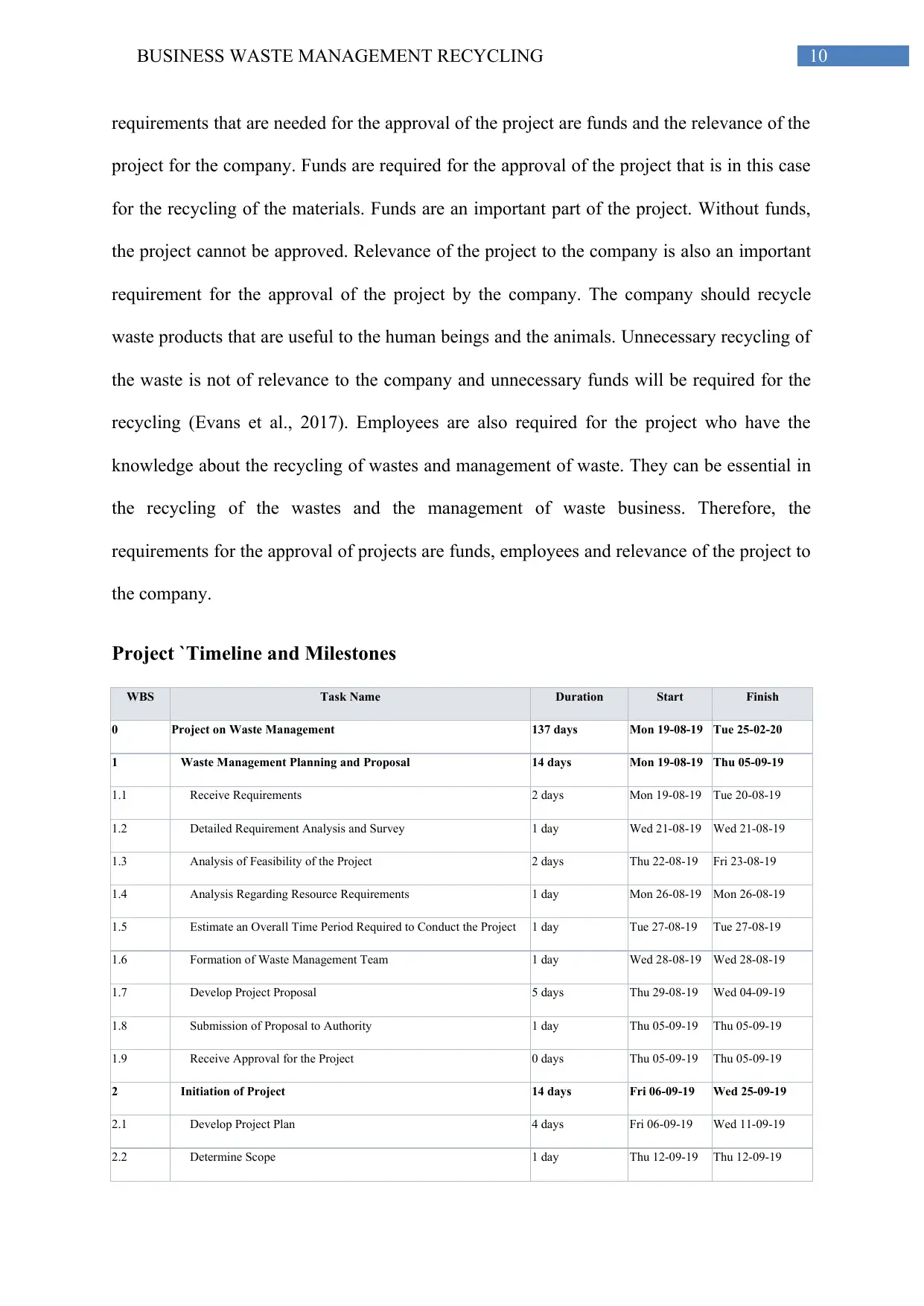
10BUSINESS WASTE MANAGEMENT RECYCLING
requirements that are needed for the approval of the project are funds and the relevance of the
project for the company. Funds are required for the approval of the project that is in this case
for the recycling of the materials. Funds are an important part of the project. Without funds,
the project cannot be approved. Relevance of the project to the company is also an important
requirement for the approval of the project by the company. The company should recycle
waste products that are useful to the human beings and the animals. Unnecessary recycling of
the waste is not of relevance to the company and unnecessary funds will be required for the
recycling (Evans et al., 2017). Employees are also required for the project who have the
knowledge about the recycling of wastes and management of waste. They can be essential in
the recycling of the wastes and the management of waste business. Therefore, the
requirements for the approval of projects are funds, employees and relevance of the project to
the company.
Project `Timeline and Milestones
WBS Task Name Duration Start Finish
0 Project on Waste Management 137 days Mon 19-08-19 Tue 25-02-20
1 Waste Management Planning and Proposal 14 days Mon 19-08-19 Thu 05-09-19
1.1 Receive Requirements 2 days Mon 19-08-19 Tue 20-08-19
1.2 Detailed Requirement Analysis and Survey 1 day Wed 21-08-19 Wed 21-08-19
1.3 Analysis of Feasibility of the Project 2 days Thu 22-08-19 Fri 23-08-19
1.4 Analysis Regarding Resource Requirements 1 day Mon 26-08-19 Mon 26-08-19
1.5 Estimate an Overall Time Period Required to Conduct the Project 1 day Tue 27-08-19 Tue 27-08-19
1.6 Formation of Waste Management Team 1 day Wed 28-08-19 Wed 28-08-19
1.7 Develop Project Proposal 5 days Thu 29-08-19 Wed 04-09-19
1.8 Submission of Proposal to Authority 1 day Thu 05-09-19 Thu 05-09-19
1.9 Receive Approval for the Project 0 days Thu 05-09-19 Thu 05-09-19
2 Initiation of Project 14 days Fri 06-09-19 Wed 25-09-19
2.1 Develop Project Plan 4 days Fri 06-09-19 Wed 11-09-19
2.2 Determine Scope 1 day Thu 12-09-19 Thu 12-09-19
requirements that are needed for the approval of the project are funds and the relevance of the
project for the company. Funds are required for the approval of the project that is in this case
for the recycling of the materials. Funds are an important part of the project. Without funds,
the project cannot be approved. Relevance of the project to the company is also an important
requirement for the approval of the project by the company. The company should recycle
waste products that are useful to the human beings and the animals. Unnecessary recycling of
the waste is not of relevance to the company and unnecessary funds will be required for the
recycling (Evans et al., 2017). Employees are also required for the project who have the
knowledge about the recycling of wastes and management of waste. They can be essential in
the recycling of the wastes and the management of waste business. Therefore, the
requirements for the approval of projects are funds, employees and relevance of the project to
the company.
Project `Timeline and Milestones
WBS Task Name Duration Start Finish
0 Project on Waste Management 137 days Mon 19-08-19 Tue 25-02-20
1 Waste Management Planning and Proposal 14 days Mon 19-08-19 Thu 05-09-19
1.1 Receive Requirements 2 days Mon 19-08-19 Tue 20-08-19
1.2 Detailed Requirement Analysis and Survey 1 day Wed 21-08-19 Wed 21-08-19
1.3 Analysis of Feasibility of the Project 2 days Thu 22-08-19 Fri 23-08-19
1.4 Analysis Regarding Resource Requirements 1 day Mon 26-08-19 Mon 26-08-19
1.5 Estimate an Overall Time Period Required to Conduct the Project 1 day Tue 27-08-19 Tue 27-08-19
1.6 Formation of Waste Management Team 1 day Wed 28-08-19 Wed 28-08-19
1.7 Develop Project Proposal 5 days Thu 29-08-19 Wed 04-09-19
1.8 Submission of Proposal to Authority 1 day Thu 05-09-19 Thu 05-09-19
1.9 Receive Approval for the Project 0 days Thu 05-09-19 Thu 05-09-19
2 Initiation of Project 14 days Fri 06-09-19 Wed 25-09-19
2.1 Develop Project Plan 4 days Fri 06-09-19 Wed 11-09-19
2.2 Determine Scope 1 day Thu 12-09-19 Thu 12-09-19
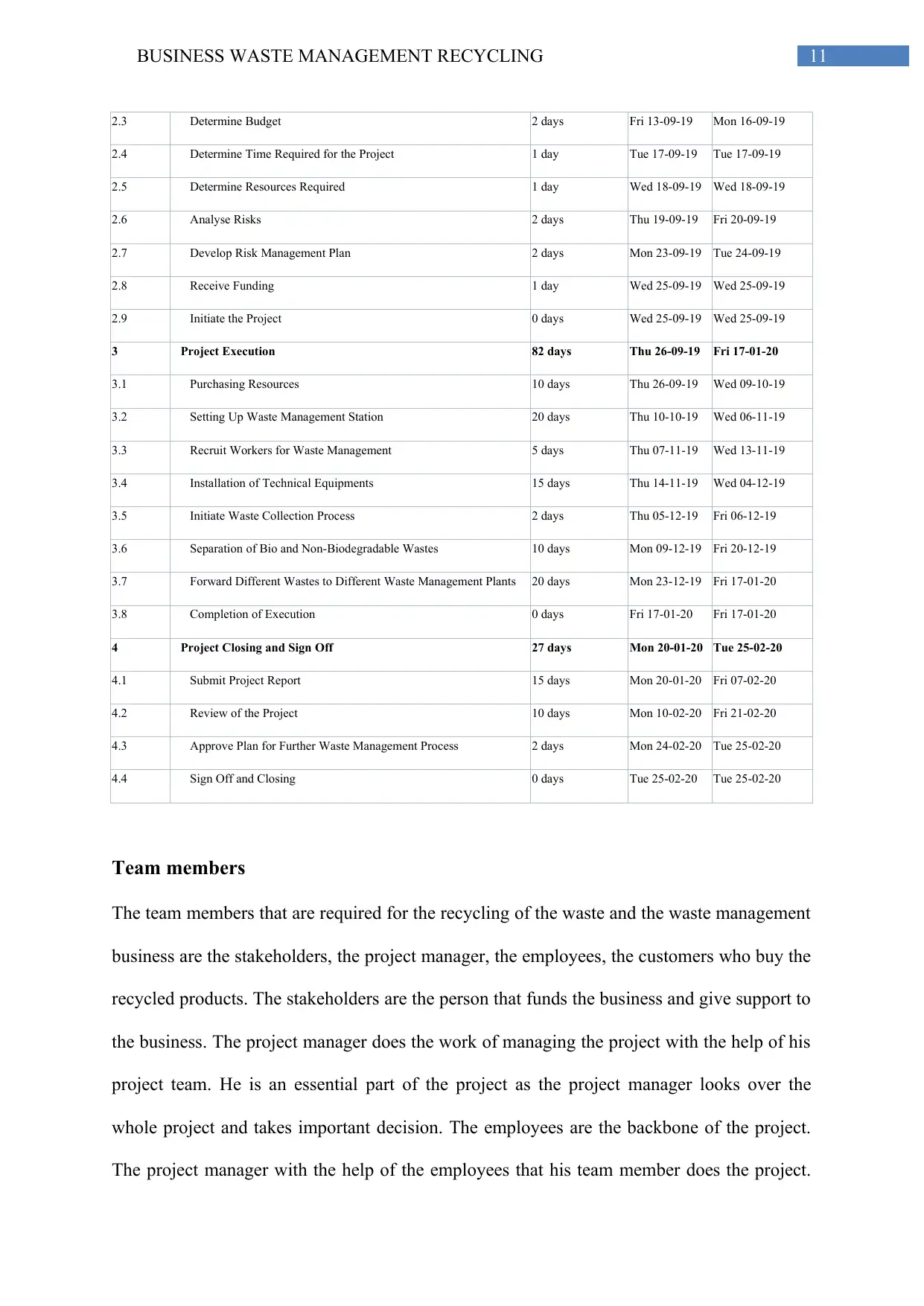
11BUSINESS WASTE MANAGEMENT RECYCLING
2.3 Determine Budget 2 days Fri 13-09-19 Mon 16-09-19
2.4 Determine Time Required for the Project 1 day Tue 17-09-19 Tue 17-09-19
2.5 Determine Resources Required 1 day Wed 18-09-19 Wed 18-09-19
2.6 Analyse Risks 2 days Thu 19-09-19 Fri 20-09-19
2.7 Develop Risk Management Plan 2 days Mon 23-09-19 Tue 24-09-19
2.8 Receive Funding 1 day Wed 25-09-19 Wed 25-09-19
2.9 Initiate the Project 0 days Wed 25-09-19 Wed 25-09-19
3 Project Execution 82 days Thu 26-09-19 Fri 17-01-20
3.1 Purchasing Resources 10 days Thu 26-09-19 Wed 09-10-19
3.2 Setting Up Waste Management Station 20 days Thu 10-10-19 Wed 06-11-19
3.3 Recruit Workers for Waste Management 5 days Thu 07-11-19 Wed 13-11-19
3.4 Installation of Technical Equipments 15 days Thu 14-11-19 Wed 04-12-19
3.5 Initiate Waste Collection Process 2 days Thu 05-12-19 Fri 06-12-19
3.6 Separation of Bio and Non-Biodegradable Wastes 10 days Mon 09-12-19 Fri 20-12-19
3.7 Forward Different Wastes to Different Waste Management Plants 20 days Mon 23-12-19 Fri 17-01-20
3.8 Completion of Execution 0 days Fri 17-01-20 Fri 17-01-20
4 Project Closing and Sign Off 27 days Mon 20-01-20 Tue 25-02-20
4.1 Submit Project Report 15 days Mon 20-01-20 Fri 07-02-20
4.2 Review of the Project 10 days Mon 10-02-20 Fri 21-02-20
4.3 Approve Plan for Further Waste Management Process 2 days Mon 24-02-20 Tue 25-02-20
4.4 Sign Off and Closing 0 days Tue 25-02-20 Tue 25-02-20
Team members
The team members that are required for the recycling of the waste and the waste management
business are the stakeholders, the project manager, the employees, the customers who buy the
recycled products. The stakeholders are the person that funds the business and give support to
the business. The project manager does the work of managing the project with the help of his
project team. He is an essential part of the project as the project manager looks over the
whole project and takes important decision. The employees are the backbone of the project.
The project manager with the help of the employees that his team member does the project.
2.3 Determine Budget 2 days Fri 13-09-19 Mon 16-09-19
2.4 Determine Time Required for the Project 1 day Tue 17-09-19 Tue 17-09-19
2.5 Determine Resources Required 1 day Wed 18-09-19 Wed 18-09-19
2.6 Analyse Risks 2 days Thu 19-09-19 Fri 20-09-19
2.7 Develop Risk Management Plan 2 days Mon 23-09-19 Tue 24-09-19
2.8 Receive Funding 1 day Wed 25-09-19 Wed 25-09-19
2.9 Initiate the Project 0 days Wed 25-09-19 Wed 25-09-19
3 Project Execution 82 days Thu 26-09-19 Fri 17-01-20
3.1 Purchasing Resources 10 days Thu 26-09-19 Wed 09-10-19
3.2 Setting Up Waste Management Station 20 days Thu 10-10-19 Wed 06-11-19
3.3 Recruit Workers for Waste Management 5 days Thu 07-11-19 Wed 13-11-19
3.4 Installation of Technical Equipments 15 days Thu 14-11-19 Wed 04-12-19
3.5 Initiate Waste Collection Process 2 days Thu 05-12-19 Fri 06-12-19
3.6 Separation of Bio and Non-Biodegradable Wastes 10 days Mon 09-12-19 Fri 20-12-19
3.7 Forward Different Wastes to Different Waste Management Plants 20 days Mon 23-12-19 Fri 17-01-20
3.8 Completion of Execution 0 days Fri 17-01-20 Fri 17-01-20
4 Project Closing and Sign Off 27 days Mon 20-01-20 Tue 25-02-20
4.1 Submit Project Report 15 days Mon 20-01-20 Fri 07-02-20
4.2 Review of the Project 10 days Mon 10-02-20 Fri 21-02-20
4.3 Approve Plan for Further Waste Management Process 2 days Mon 24-02-20 Tue 25-02-20
4.4 Sign Off and Closing 0 days Tue 25-02-20 Tue 25-02-20
Team members
The team members that are required for the recycling of the waste and the waste management
business are the stakeholders, the project manager, the employees, the customers who buy the
recycled products. The stakeholders are the person that funds the business and give support to
the business. The project manager does the work of managing the project with the help of his
project team. He is an essential part of the project as the project manager looks over the
whole project and takes important decision. The employees are the backbone of the project.
The project manager with the help of the employees that his team member does the project.
⊘ This is a preview!⊘
Do you want full access?
Subscribe today to unlock all pages.

Trusted by 1+ million students worldwide
1 out of 15
Related Documents
Your All-in-One AI-Powered Toolkit for Academic Success.
+13062052269
info@desklib.com
Available 24*7 on WhatsApp / Email
![[object Object]](/_next/static/media/star-bottom.7253800d.svg)
Unlock your academic potential
Copyright © 2020–2026 A2Z Services. All Rights Reserved. Developed and managed by ZUCOL.





